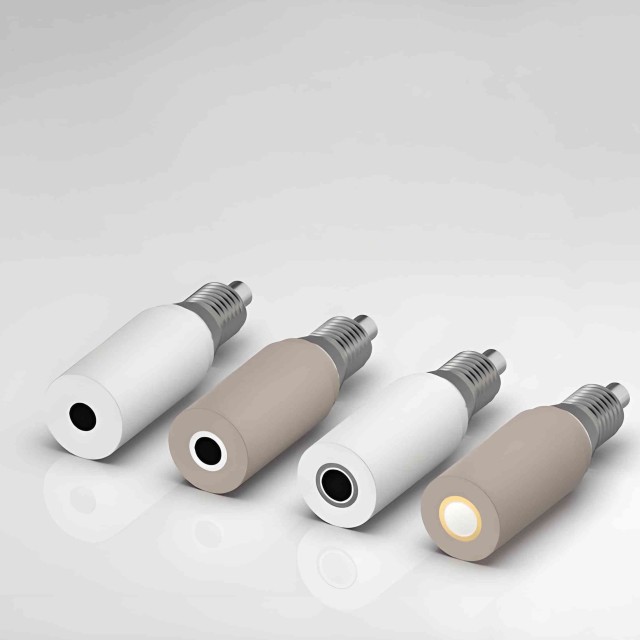
Electrochemical Consumables
RRDE rotating disk (ring disk) electrode / compatible with PINE, Japanese ALS, Swiss Metrohm glassy carbon platinum
Item Number : ELER
Price varies based on specs and customizations
$399.00 / set
- Specifications
- 5mm gold/platinum/glassy carbon
- Applicable temperature range
- 10 ~ 25℃
- Purity
- 99.99%
- Guide material
- glassy carbon + platinum ring
Shipping:
Contact us to get shipping details Enjoy On-time Dispatch Guarantee.
Why Choose Us
Easy ordering process, quality products, and dedicated support for your business success.
Introduction
The RRDE, featuring a central disk and a concentric ring, is a powerful tool for studying complex reaction mechanisms. It allows researchers to not only analyze electrochemical properties at the disk but also to detect and quantify reaction intermediates by collecting them at the ring. This dual-electrode system provides deeper insights into multi-electron processes and reaction kinetics.
Constructed with a choice of high-purity electrode materials—including Glassy Carbon (GC), Platinum (Pt), Gold (Au), Copper (Cu), Palladium (Pd), and Titanium (Ti)—and housed in robust insulating shrouds of PEEK or PTFE, our electrodes are built to last. The PEEK shroud offers excellent chemical resistance and thermal stability up to 80°C, while the PTFE shroud is ideal for work at room temperature (10°C to 25°C). The precision screw-thread design ensures a secure connection and stable signal transmission.
Detail & Parts
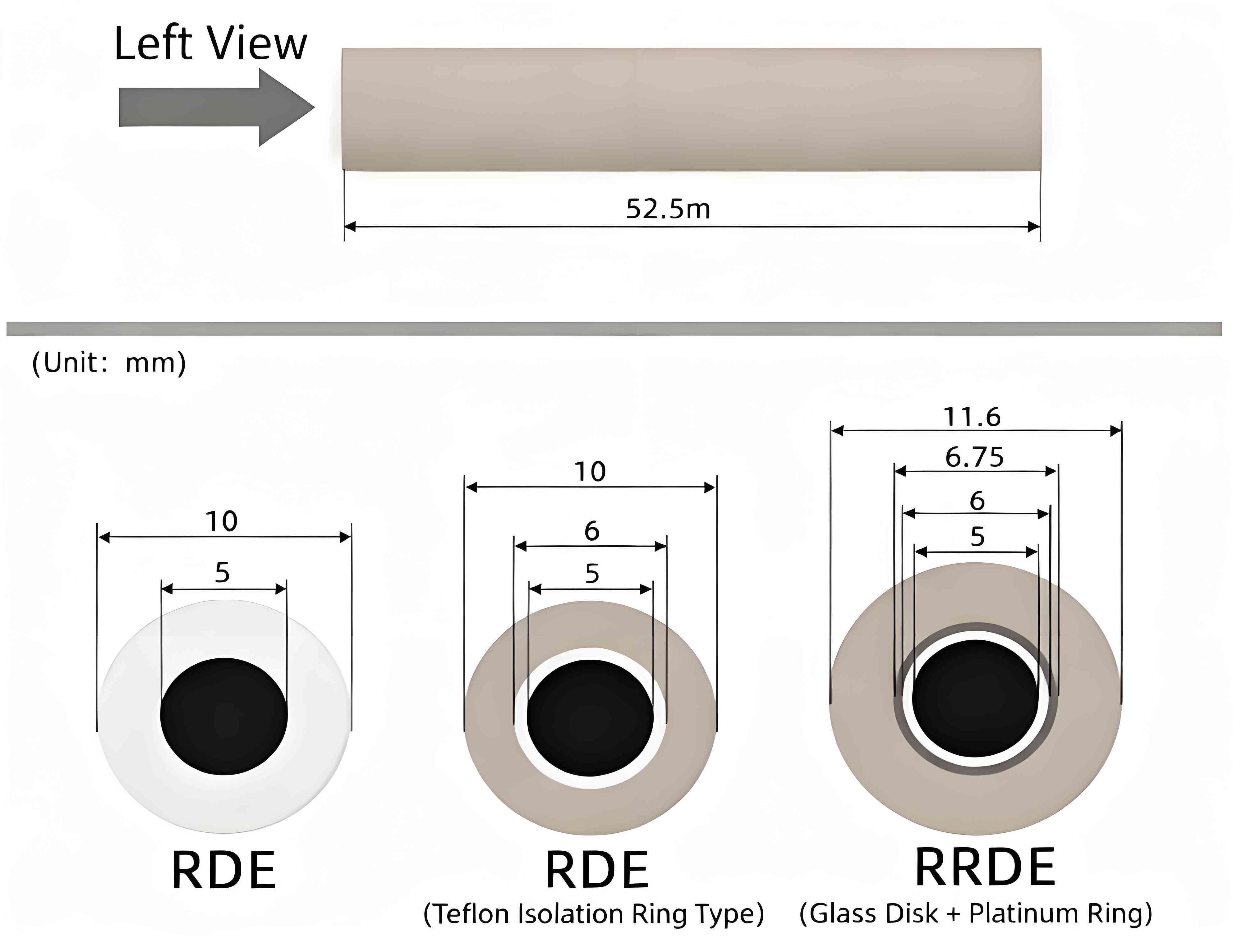
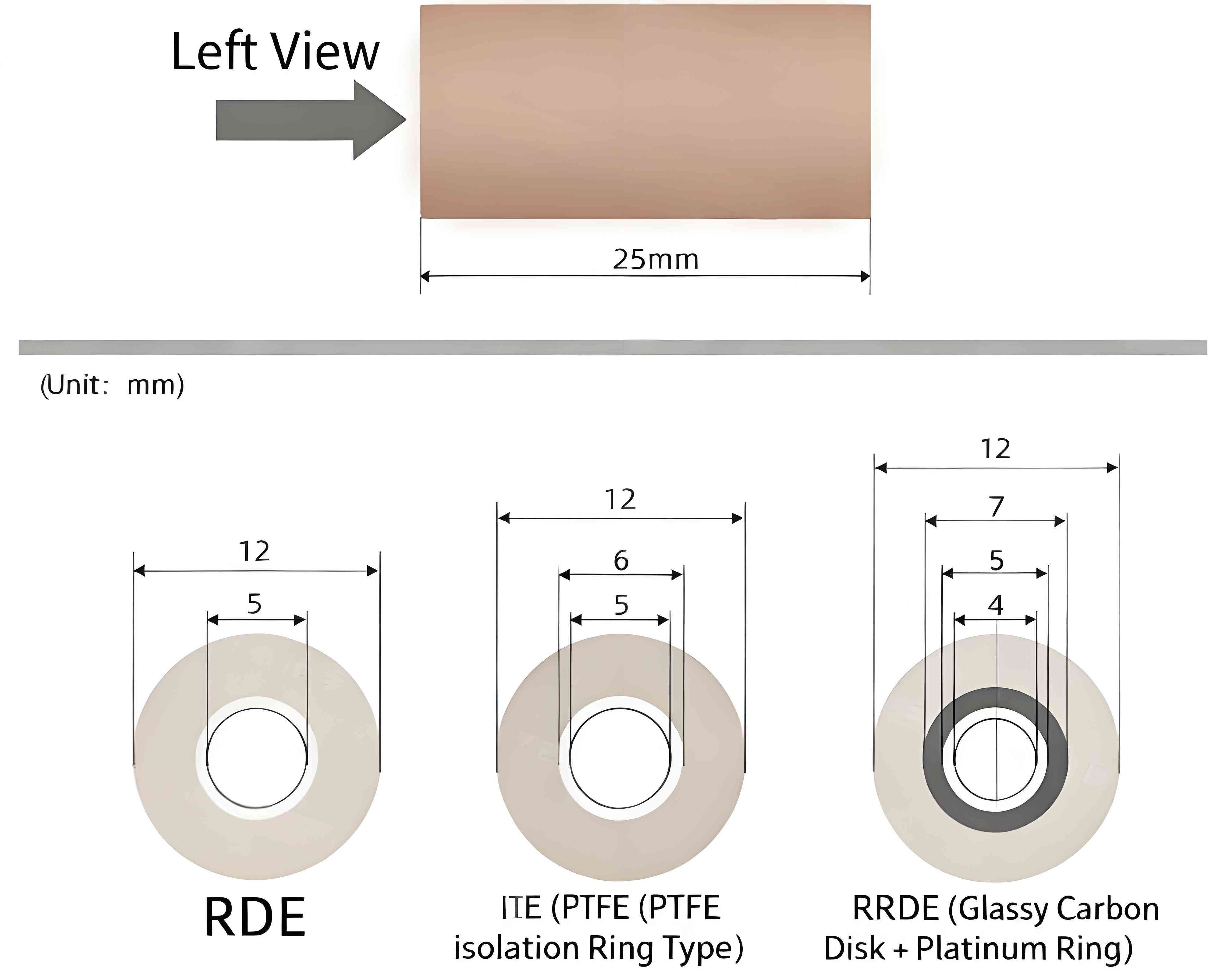
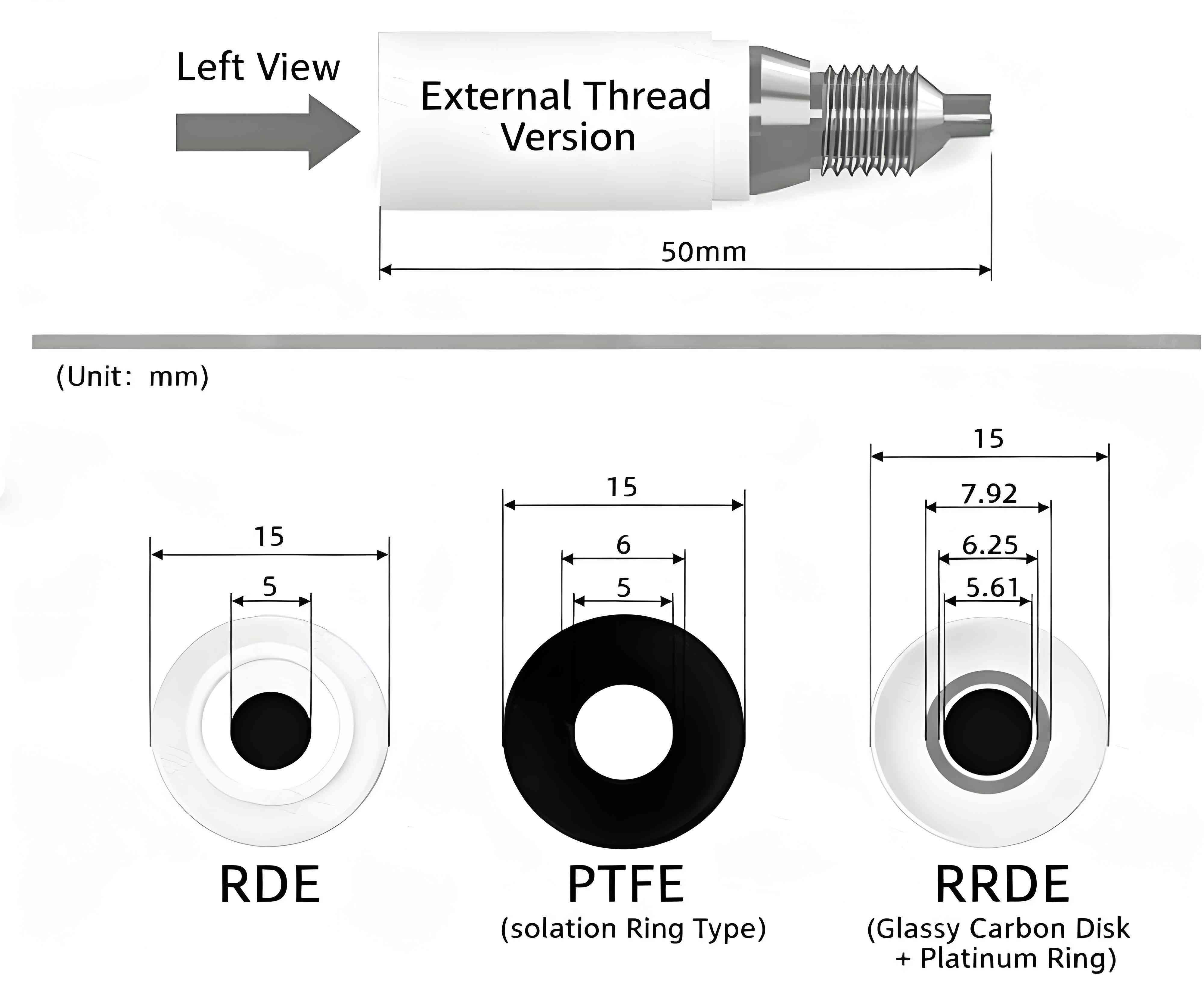
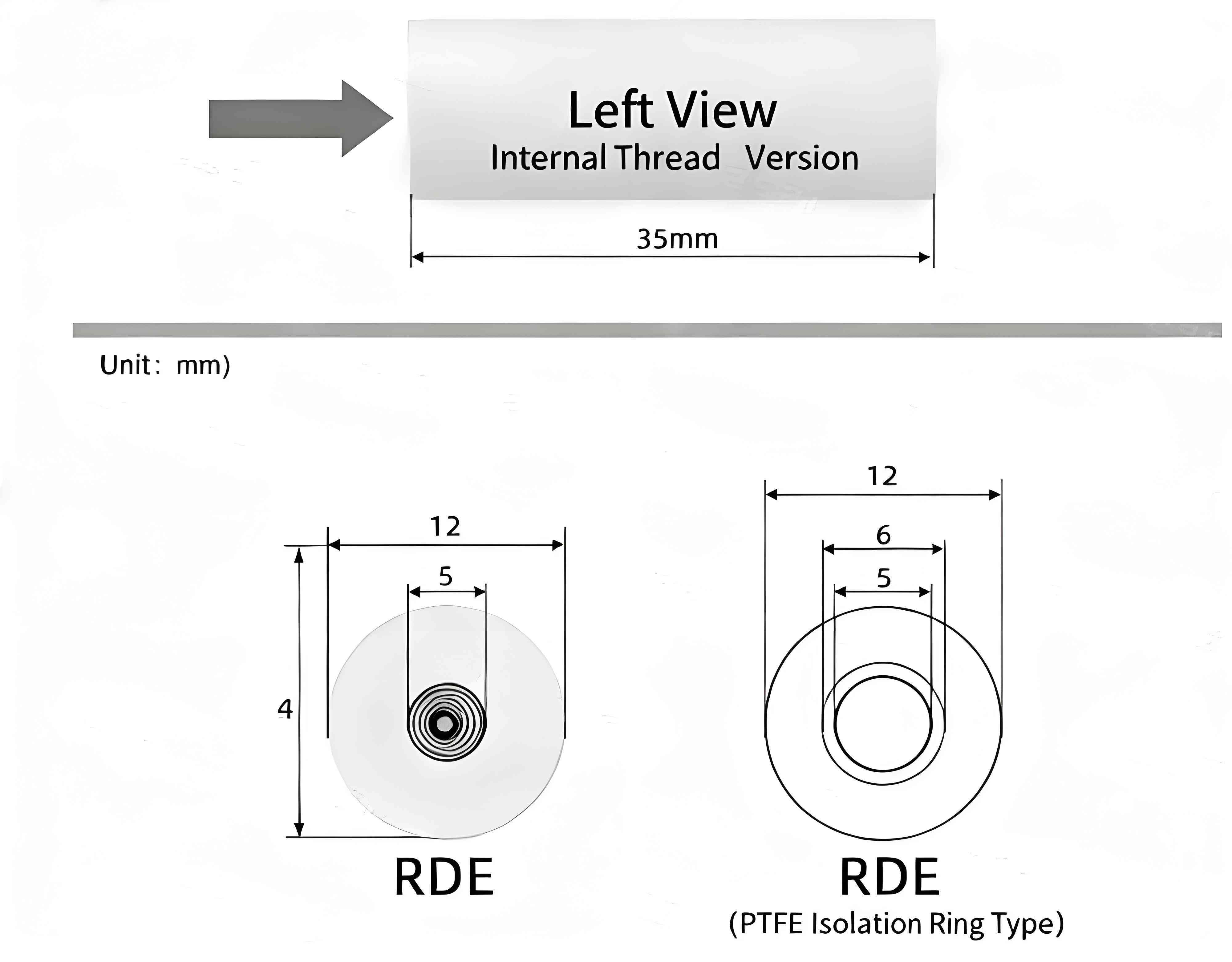
Product Specifications
For PINE Rotator Systems (External Thread)
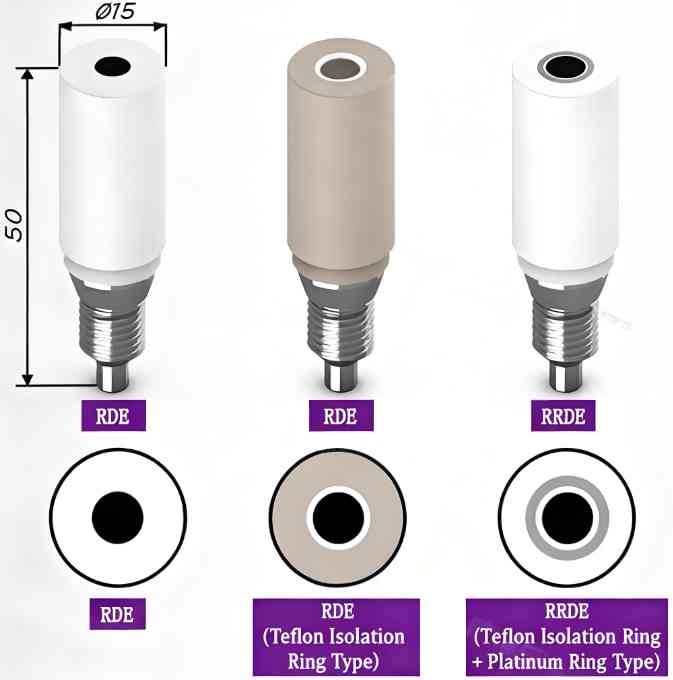
| Product No. | Product Name | Length (mm) | Insulator OD (mm) | Ring Dimensions OD/ID (mm) | Disk Diameter (mm) |
|---|---|---|---|---|---|
| RDE | |||||
| RDE0111 | RDE GC/Glassy Carbon Electrode | 50 | 15 | -- | 5.0 |
| RDE0112 | RDE Pt/Platinum Electrode | 50 | 15 | -- | 5.0 |
| RDE0113 | RDE Au/Gold Electrode | 50 | 15 | -- | 5.0 |
| RDE0114 | RDE Cu/Copper Electrode | 50 | 15 | -- | 5.0 |
| RDE0115 | RDE Pd/Palladium Electrode | 50 | 15 | -- | 5.0 |
| RDE0116 | RDE Ti/Titanium Electrode | 50 | 15 | -- | 5.0 |
| RDE0211 | RDE PTFE Insulator/GC Electrode | 50 | 15 | 6.0 | 5.0 |
| RDE0212 | RDE PTFE Insulator/Pt Electrode | 50 | 15 | 6.0 | 5.0 |
| RDE0213 | RDE PTFE Insulator/Au Electrode | 50 | 15 | 6.0 | 5.0 |
| RRDE | |||||
| RRDE0311 | RRDE PTFE Insulator/GC Disk + Pt Ring | 50 | 15 | 7.92 / 6.25 | 5.61 |
| RRDE0312 | RRDE Pt Disk + Pt Ring | 50 | 15 | 7.92 / 6.25 | 5.61 |
| RRDE0313 | RRDE Au Disk + Pt Ring | 50 | 15 | 7.92 / 6.25 | 5.61 |
For PINE Rotator Systems (Internal Thread)
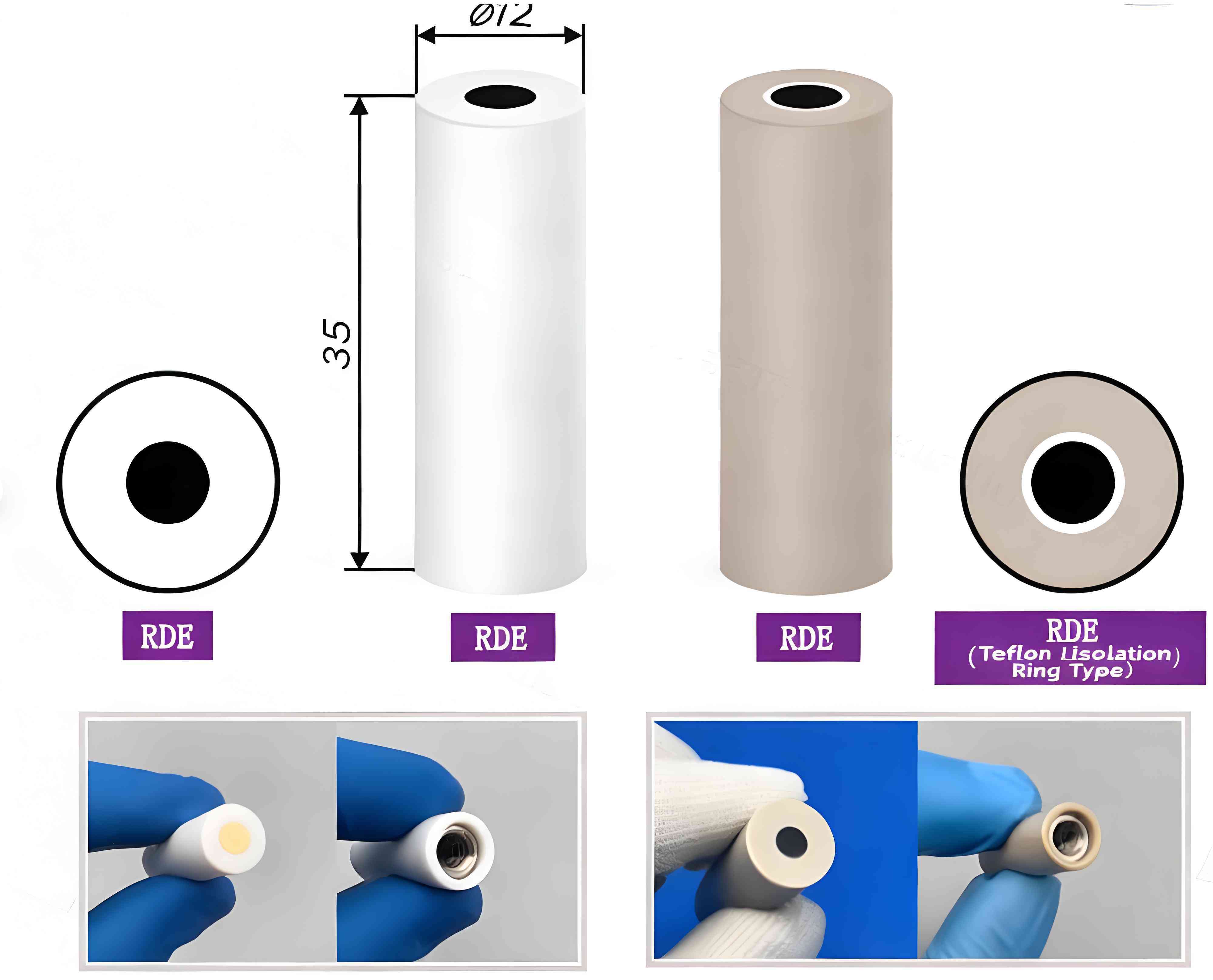
| Product No. | Product Name | Length (mm) | Insulator OD (mm) | Disk Diameter (mm) |
|---|---|---|---|---|
| RDE | ||||
| RDE1111 | RDE GC/Glassy Carbon Electrode | 35 | 12 | 5.0 |
| RDE1112 | RDE Pt/Platinum Electrode | 35 | 12 | 5.0 |
| RDE1113 | RDE Au/Gold Electrode | 35 | 12 | 5.0 |
| RDE1114 | RDE Cu/Copper Electrode | 35 | 12 | 5.0 |
| RDE1115 | RDE Pd/Palladium Electrode | 35 | 12 | 5.0 |
| RDE1116 | RDE Ti/Titanium Electrode | 35 | 12 | 5.0 |
| RDE1211 | RDE PTFE Insulator/GC Electrode | 35 | 12 | 5.0 |
| RDE1212 | RDE PTFE Insulator/Pt Electrode | 35 | 12 | 6.0 |
| RDE1213 | RDE PTFE Insulator/Au Electrode | 35 | 12 | 6.0 |
For ALS (Japan) Rotator Systems (Internal Thread)
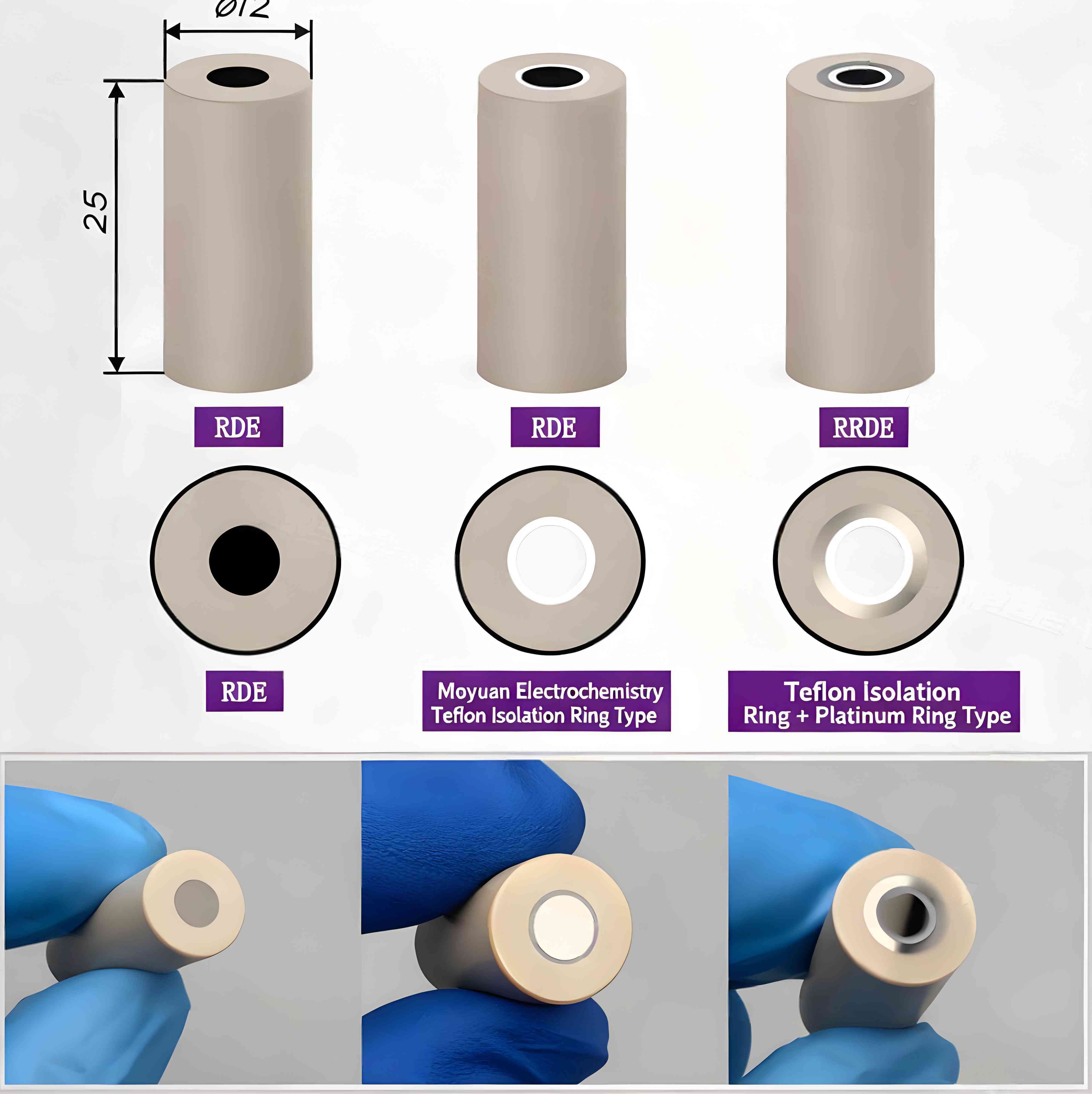
| Product No. | Product Name | Length (mm) | Insulator OD (mm) | Ring Dimensions OD/ID (mm) | Disk Diameter (mm) |
|---|---|---|---|---|---|
| RDE | |||||
| RDE0121 | RDE GC/Glassy Carbon Electrode | 25 | 12 | -- | 3.0 |
| RDE0122 | RDE GC/Glassy Carbon Electrode | 25 | 12 | -- | 5.0 |
| RDE0123 | RDE Pt/Platinum Electrode | 25 | 12 | -- | 3.0 |
| RDE0124 | RDE Au/Gold Electrode | 25 | 12 | -- | 3.0 |
| RDE0125 | RDE Cu/Copper Electrode | 25 | 12 | -- | 3.0 |
| RDE0126 | RDE Pd/Palladium Electrode | 25 | 12 | -- | 3.0 |
| RDE0127 | RDE Ti/Titanium Electrode | 25 | 12 | -- | 5.0 |
| RDE0221 | RDE PTFE Insulator/GC Electrode | 25 | 12 | 4.0 | 3.0 |
| RDE0222 | RDE PTFE Insulator/Pt Electrode | 25 | 12 | 4.0 | 3.0 |
| RDE0223 | RDE PTFE Insulator/Au Electrode | 25 | 12 | 4.0 | 3.0 |
| RRDE | |||||
| RRDE0321 | RRDE PTFE Insulator/GC Disk + Pt Ring | 25 | 12 | 7.0 / 5.0 | 4.0 |
| RRDE0322 | RRDE Pt Disk + Pt Ring | 25 | 12 | 7.0 / 5.0 | 4.0 |
| RRDE0323 | RRDE Au Disk + Pt Ring | 25 | 12 | 7.0 / 5.0 | 4.0 |
For Metrohm (Switzerland) Rotator Systems (Internal Thread)
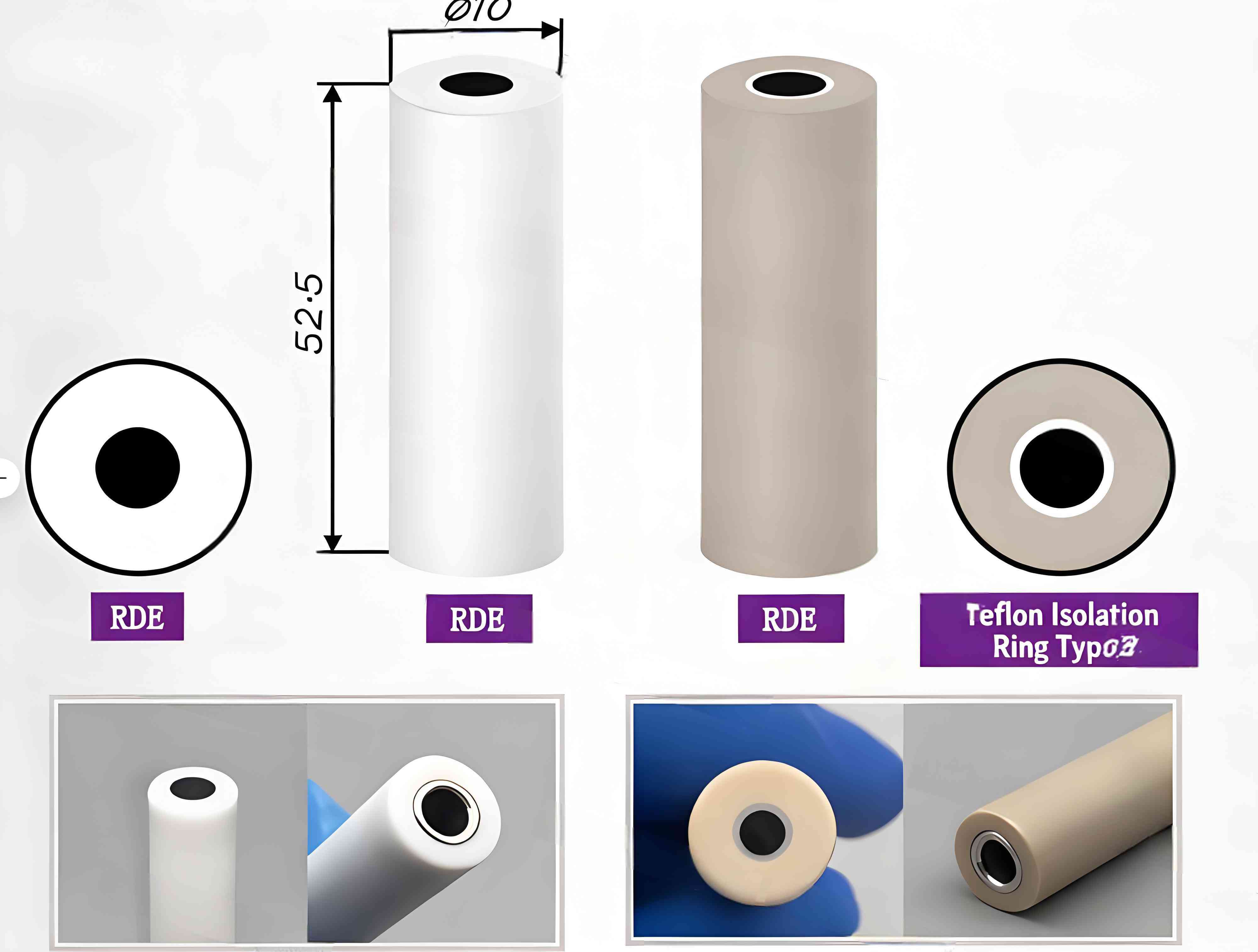
| Product No. | Product Name | Length (mm) | Insulator OD (mm) | Special Insulator OD (mm) | Disk Diameter (mm) |
|---|---|---|---|---|---|
| RDE | |||||
| RDE0131 | RDE GC/Glassy Carbon Electrode | 52.5 | 10 | -- | 5.0 |
| RDE0132 | RDE Pt/Platinum Electrode | 52.5 | 10 | -- | 5.0 |
| RDE0133 | RDE Au/Gold Electrode | 52.5 | 10 | -- | 5.0 |
| RDE0134 | RDE Cu/Copper Electrode | 52.5 | 10 | -- | 5.0 |
| RDE0135 | RDE Pd/Palladium Electrode | 52.5 | 10 | -- | 5.0 |
| RDE0136 | RDE Ti/Titanium Electrode | 52.5 | 10 | -- | 5.0 |
| RDE0231 | RDE PTFE Insulator/GC Electrode | 52.5 | 10 | 6.0 | 5.0 |
| RDE0232 | RDE PTFE Insulator/Pt Electrode | 52.5 | 10 | 6.0 | 5.0 |
| RDE0233 | RDE PTFE Insulator/Au Electrode | 52.5 | 10 | 6.0 | 5.0 |
Key Advantages and Customer Value
- Broad Compatibility: Our electrodes are designed to be fully compatible with major rotator systems from manufacturers including PINE, ALS (Japan), and Metrohm (Switzerland), ensuring seamless integration into your existing laboratory setup.
- Superior Materials: The use of acid and alkali-resistant materials guarantees longevity and consistent performance even in harsh chemical environments.
- Precision and Reliability: Meticulous manufacturing ensures dimensional accuracy for reproducible results, while the secure design minimizes signal noise and enhances data quality.
- Customization Service: We specialize in creating custom electrodes tailored to your specific research needs. Whether you require unique dimensions, different material combinations, or specialized configurations, our team can deliver a solution from prototype to mass production.
Applications in Leading Research Fields
These electrodes are indispensable tools for a wide range of advanced research areas, including:
- Fuel Cell and Battery Research: Evaluating the efficiency and mechanisms of catalysts for energy conversion and storage.
- Electrocatalysis: Investigating the kinetics and pathways of catalytic reactions, such as the Oxygen Reduction Reaction (ORR) and Oxygen Evolution Reaction (OER).
- Air-Battery Studies: Analyzing the performance of metal-air battery components.
- Mechanism Analysis: Studying complex electrochemical reactions by detecting intermediate products in real-time.
Whether you require a standard electrode for routine analysis or a fully customized solution for groundbreaking research, our team is ready to assist. To discuss your specific requirements or to get a quote for a custom-designed electrode, please contact us through our inquiry form and let our experts handle the rest.
Designed for You
KinTek provide deep custom made service and equipment to worldwide customers, our specialized teamwork and rich experienced engineers are capable to undertake the custom tailoring hardware and software equipment requirements, and help our customer to build up the exclusive and personalized equipment and solution!
Would you please drop your ideas to us, our engineers are ready for you now!
Trusted by Industry Leaders

FAQ
What Is Rotating Disk Electrode Used For?
What Is An Electrode In Electrochemistry?
What Is The Rotating Electrode Method?
What Are The 3 Electrodes In Electrochemistry?
What Is The Rotating Ring-disk Electrode Method?
What Are The Different Types Of Electrochemical Electrodes?
What Are The Advantages Of Rotating Disc Electrode?
What Materials Are Commonly Used For Electrochemical Electrodes?
What Factors Should Be Considered When Selecting An Electrochemical Electrode?
How Can Electrochemical Electrodes Be Used In Various Applications?
4.9 / 5
Incredible precision! The data quality is a game-changer for our catalysis research. Seamless integration with our Metrohm setup.
4.8 / 5
Flawless compatibility with our ALS rotator. The build quality is exceptional, truly built to last. A brilliant investment.
4.7 / 5
Arrived faster than expected! The PEEK shroud handles our harsh conditions perfectly. Superior performance, great value.
4.9 / 5
Revolutionized our ORR studies. The ability to detect intermediates is priceless. Unmatched reliability and tech.
4.8 / 5
The craftsmanship is outstanding. Perfect fit for our PINE system right out of the box. A researcher's dream tool.
4.9 / 5
Top-tier materials, zero signal noise. Accelerated our battery research significantly. Worth every penny.
4.7 / 5
Excellent chemical resistance. The PTFE shroud is ideal for our lab. Consistent, reproducible results every time.
4.8 / 5
Durability is impressive. Withstands rigorous daily use. The screw-thread design ensures a rock-solid connection.
4.9 / 5
Fast shipping, even internationally. The glassy carbon surface is flawless. Essential for advanced mechanism analysis.
4.8 / 5
A technologically advanced masterpiece. Simplifies complex reaction studies. The gold standard in electrodes.
4.7 / 5
Great price for such high quality. The platinum ring's sensitivity is remarkable. Exceeded all expectations.
4.9 / 5
Customization service is fantastic. They delivered exactly what we needed for our unique fuel cell project.
4.8 / 5
Plug-and-play with our existing equipment. The dimensional accuracy is spot-on. Highly recommend!
4.7 / 5
Robust and reliable. Perfect for long-term air-battery studies. The customer support was also excellent.
4.9 / 5
Superior to other brands we've tried. The thermal stability of the PEEK shroud is a huge advantage.
4.8 / 5
A workhorse in the lab. Delivers precise, high-quality data day in and day out. Fantastic product.
4.7 / 5
Excellent value for money. The electrode's performance has significantly boosted our research output.
4.9 / 5
Cutting-edge technology made accessible. The dual-electrode system provides insights we couldn't get before.
4.8 / 5
The precision manufacturing is evident. Perfect for kinetic studies. A must-have for any serious electrochemist.
REQUEST A QUOTE
Our professional team will reply to you within one business day. Please feel free to contact us!
Related Products

Rotating Platinum Disk Electrode for Electrochemical Applications
Upgrade your electrochemical experiments with our Platinum Disc Electrode. High-quality and reliable for accurate results.
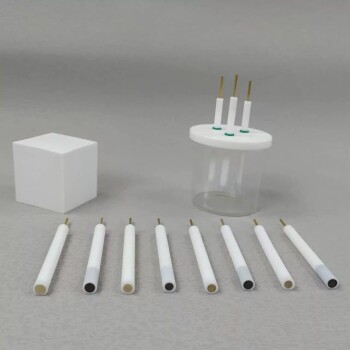
Metal Disc Electrode Electrochemical Electrode
Elevate your experiments with our Metal Disk Electrode. High-quality, acid and alkali resistant, and customizable to fit your specific needs. Discover our complete models today.
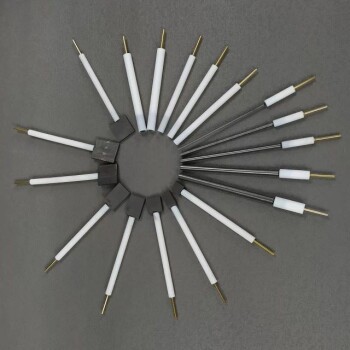
Graphite Disc Rod and Sheet Electrode Electrochemical Graphite Electrode
High-quality graphite electrodes for electrochemical experiments. Complete models with acid and alkali resistance, safety, durability, and customization options.
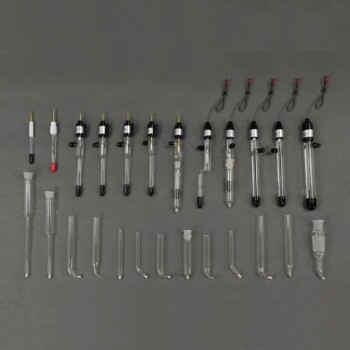
Reference Electrode Calomel Silver Chloride Mercury Sulfate for Laboratory Use
Find high-quality reference electrodes for electrochemical experiments with complete specifications. Our models offer resistance to acid and alkali, durability, and safety, with customization options available to meet your specific needs.

Platinum Sheet Electrode for Laboratory and Industrial Applications
Elevate your experiments with our Platinum Sheet Electrode. Crafted with quality materials, our safe and durable models can be tailored to fit your needs.

Platinum Auxiliary Electrode for Laboratory Use
Optimize your electrochemical experiments with our Platinum Auxiliary Electrode. Our high-quality, customizable models are safe and durable. Upgrade today!

Gold Disc Electrode
Looking for a high-quality gold disc electrode for your electrochemical experiments? Look no further than our top-of-the-line product.
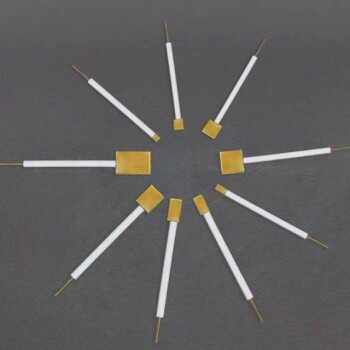
Gold Electrochemical Sheet Electrode Gold Electrode
Discover high-quality gold sheet electrodes for safe and durable electrochemical experiments. Choose from complete models or customize to meet your specific needs.
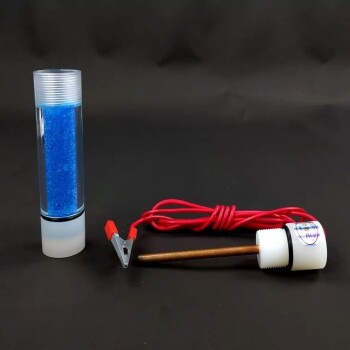
Copper Sulfate Reference Electrode for Laboratory Use
Looking for a Copper Sulfate Reference Electrode? Our complete models are made of high-quality materials, ensuring durability and safety. Customization options available.

Glassy Carbon Electrochemical Electrode
Upgrade your experiments with our Glassy Carbon Electrode. Safe, durable, and customizable to fit your specific needs. Discover our complete models today.

Sample Support Body for Electrochemical Tests
Improve your electrochemical tests with our Sample Support Body. High-quality and reliable for accurate results. Upgrade your research today.
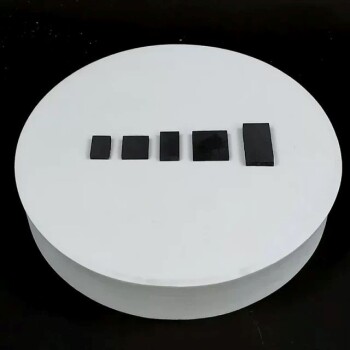
Glassy Carbon Sheet RVC for Electrochemical Experiments
Discover our Glassy Carbon Sheet - RVC. Perfect for your experiments, this high-quality material will elevate your research to the next level.
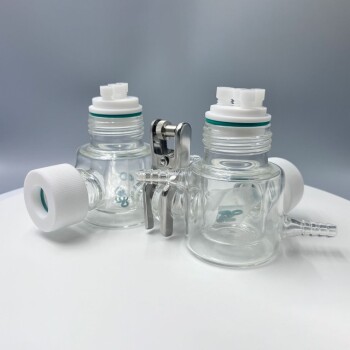
H-Type Double-Layer Optical Electrolytic Electrochemical Cell with Water Bath
Double-layer H-type optical water bath electrolytic cells, with excellent corrosion resistance and a wide range of specifications available. Customization options are also available.

Quartz Electrolytic Electrochemical Cell for Electrochemical Experiments
Looking for a reliable quartz electrochemical cell? Our product boasts excellent corrosion resistance and complete specifications. With high-quality materials and good sealing, it's both safe and durable. Customize to meet your needs.

Laboratory Disc Rotary Mixer for Efficient Sample Mixing and Homogenization
Efficient Laboratory Disc Rotary Mixer for Precise Sample Mixing, Versatile for Various Applications, DC Motor and Microcomputer Control, Adjustable Speed and Angle.

Electrolytic Electrochemical Cell for Coating Evaluation
Looking for corrosion-resistant coating evaluation electrolytic cells for electrochemical experiments? Our cells boast complete specifications, good sealing, high-quality materials, safety, and durability. Plus, they're easily customizable to meet your needs.
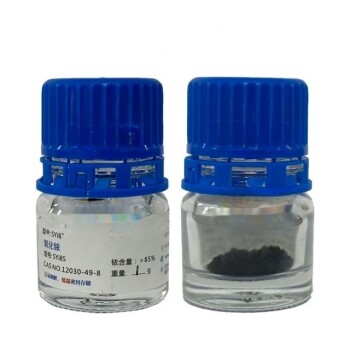
Iridium Dioxide IrO2 for Water Electrolysis
Iridium dioxide, whose crystal lattice is rutile structure. Iridium dioxide and other rare metal oxides can be used in anode electrodes for industrial electrolysis and microelectrodes for electrophysiological research.
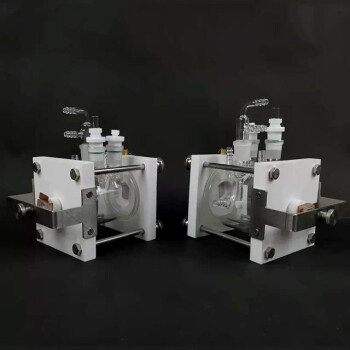
Flat Corrosion Electrolytic Electrochemical Cell
Discover our flat corrosion electrolytic cell for electrochemical experiments. With exceptional corrosion resistance and complete specifications, our cell guarantees optimal performance. Our high-quality materials and good sealing ensure a safe and durable product, and customization options are available.

Vacuum Sealed Continuous Working Rotary Tube Furnace Rotating Tube Furnace
Experience efficient material processing with our vacuum-sealed rotary tube furnace. Perfect for experiments or industrial production, equipped with optional features for controlled feeding and optimized results. Order now.
Related Articles

Comprehensive Guide to Rotating Disk Electrode (RDE) in Electrochemical Studies
Explore the detailed workings, applications, and significance of Rotating Disk Electrodes (RDE) in electrochemical research. Discover how RDEs are used in fuel cells, catalyst development, and more.

Electrode Materials for Rotating Ring-Disk Electrodes
Rotating ring-disk electrodes (RRDEs) are used in a wide range of applications, from fuel cells to sensors, and they require careful selection of electrode materials for optimal performance.

Advantages of the Rotating Electrode Method
Rotating electrode method involves rotating a small working electrode to increase the mass transport of reactants and products, allowing for more precise measurements and better control of reaction conditions.

Understanding Electrodeposition with Electrochemical Electrodes
Electrodeposition is a process of depositing a metal or a non-metallic material onto a surface by applying an electric current.

Innovations in Electrochemical Electrodes Technology
Recent advancements in nanotechnology and materials science have led to significant improvements in electrochemical devices, making them more efficient, durable, and cost-effective.

The Future of Electrochemical Electrodes
The latest trends and developments in electrode materials and their implications for the future of electrochemistry.

Exploring Rotating Electrode Technology in Electrochemistry
An in-depth analysis of rotating electrode technology, its applications, and its impact on electrochemical reactions under different flow conditions.

Pseudo-Reference Electrodes When and How to Use Them
Reference electrodes are an essential component in electrochemical measurements. They are used to establish a stable and reproducible potential for the working electrode and provide a reference point for the measurement. The reference electrode should have a stable and well-defined potential, which is independent of the solution's composition and the working electrode's potential.

Introduction to Rotating Disc Electrodes and Common Electrochemical Applications
An overview of rotating disc electrodes and their applications in various electrochemical studies, including catalyst evaluation, battery research, and corrosion protection.

Comprehensive Guide to Reference Electrodes: Types, Applications, and Selection Criteria
Explore the world of reference electrodes with our detailed guide. Learn about different types, their applications, and how to select the right one for your needs. Ideal for researchers and lab technicians.

Understanding the Rotating Disk Electrode: Principles and Applications
Explores the development, principles, and applications of the rotating disk electrode in electrochemistry.

Basic Principles and Applications of Rotating Disc Electrodes
Explores the development, principles, and applications of Rotating Disc Electrodes in electrochemistry.